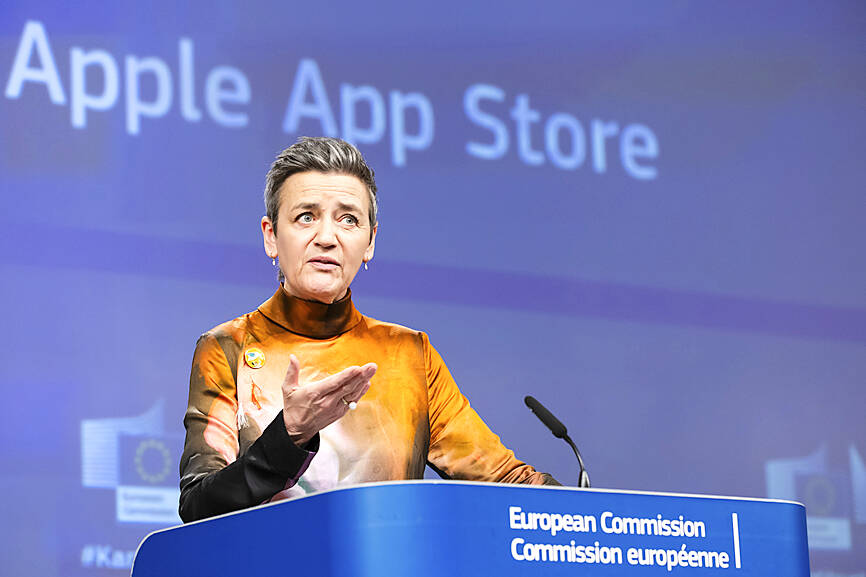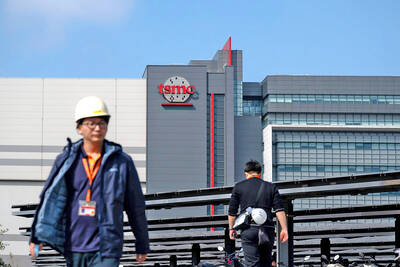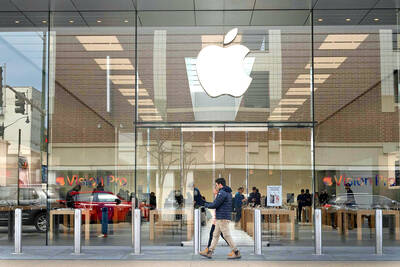The European Union leveled its first antitrust penalty against Apple Inc yesterday, fining the US tech giant nearly US$2 billion for breaking the bloc’s competition laws by unfairly favoring its own music streaming service over rivals.
Apple banned app developers from “fully informing iOS users about alternative and cheaper music subscription services outside of the app,” said the European Commission, the 27-nation bloc’s executive arm and top antitrust enforcer.
“This is illegal, and it has impacted millions of European consumers,” EU Commissioner for Competition Margrethe Vestager said at a news conference in Brussels, Belgium.

Photo: Geert Vanden Wijngaert, AP
Apple behaved this way for almost a decade, which meant many users paid “significantly higher prices for music streaming subscriptions,” the commission said.
The 1.8 billion-euro fine follows a long-running investigation triggered by a complaint from Swedish streaming service Spotify Technology SA five years ago.
The EU has led global efforts to crack down on Big Tech companies, including a series of multbillion-dollar fines for Google and charging Meta Platforms Inc with distorting the online classified ad market. The commission also has opened a separate antitrust investigation into Apple’s mobile payments service.
Apple hit back at both the commission and Spotify, saying it would appeal the penalty.
“The decision was reached despite the Commission’s failure to uncover any credible evidence of consumer harm, and ignores the realities of a market that is thriving, competitive, and growing fast,” the company said in a statement.
It said Spotify stood to benefit from the decision, asserting that the Swedish streaming service that holds a 56 percent share of Europe’s music streaming market and doesn’t pay Apple for using its App Store met 65 times with the commission over eight years.
“Ironically, in the name of competition, today’s decision just cements the dominant position of a successful European company that is the digital music market’s runaway leader,” Apple said.
The commission’s investigation initially centered on two concerns. One was the iPhone maker’s practice of forcing app developers that are selling digital content to use its in-house payment system, which charges a 30 percent commission on all subscriptions.
But the EU later dropped that to focus on how Apple prevents app makers from telling their users about cheaper ways to pay for subscriptions that don’t involve going through an app.
The investigation found that Apple banned streaming services from telling users about how much subscription offers cost outside of their apps, including links in their apps to pay for alternative subscriptions or even emailing users to tell them about different pricing options.
The fine comes the same week that new EU rules are set to kick in that are aimed at preventing tech companies from dominating digital markets.
The Digital Markets Act (DMA), due to take effect on Thursday, imposes a set of do’s and don’ts on “gatekeeper” companies including Apple, Meta, Google parent Alphabet Inc and TikTok parent ByteDance Ltd (字節跳動) — under threat of hefty fines.
The DMA’s provisions are designed to prevent tech giants from the sort of behavior that’s at the heart of the Apple investigation. Apple has already revealed how it will comply, including allowing iPhone users in Europe to use app stores other than its own and enabling developers to offer alternative payment systems.
The commission also has opened a separate antitrust investigation into Apple’s mobile payments service, and the company has promised to open up its tap-and-go mobile payment system to rivals in order to resolve it.

Apple Inc has closed in on an agreement with OpenAI to use the start-up’s technology on the iPhone, part of a broader push to bring artificial intelligence (AI) features to its devices, people familiar with the matter said. The two sides have been finalizing terms for a pact to use ChatGPT features in Apple’s iOS 18, the next iPhone operating system, said the people, who asked not to be identified because the situation is private. Apple also has held talks with Alphabet Inc’s Google about licensing its Gemini chatbot. Those discussions have not led to an agreement, but are ongoing. An OpenAI

INSATIABLE: Almost all AI innovators are working with the chipmaker to address the rapidly growing AI-related demand for energy-efficient computing power, the CEO said Taiwan Semiconductor Manufacturing Co (TSMC, 台積電) yesterday reported about 60 percent annual growth in revenue for last month, benefiting from rapidly growing demand for artificial intelligence (AI) and high-performance computing applications. Revenue last month expanded to NT$236.02 billion (US$7.28 billion), compared with NT$147.9 billion in April last year, the second-highest level in company history, TSMC said in a statement. On a monthly basis, revenue surged 20.9 percent, from NT$195.21 billion in March. As AI-related applications continue to show strong growth, TSMC expects revenue to expand about 27.6 percent year-on-year during the current quarter to between US$19.6 billion and US$20.4 billion. That would

Apple Inc has been developing a homegrown chip to run artificial intelligence (AI) tools in data centers, although it is unclear if the semiconductor would ever be deployed, the Wall Street Journal reported on Monday. The effort would build on Apple’s previous efforts to make in-house chips, which run in its iPhones, Macs and other devices, according to the Journal, which cited unidentified people familiar with the matter. The server project is code-named ACDC (Apple Chips in Data Center) within the company, aiming to utilize Apple’s expertise in chip design for the company’s server infrastructure, the newspaper said. While this initiative has been

‘FULL SUPPORT’: Kumamoto Governor Takashi Kimura said he hopes more companies would settle in the prefecture to create an area similar to Taiwan’s Hsinchu Science Park The newly elected governor of Japan’s Kumamoto Prefecture said he is ready to ensure wide-ranging support to woo Taiwan Semiconductor Manufacturing Co (TSMC, 台積電) to build its third Japanese chip factory there. Concerns of groundwater shortages when TSMC’s two plants begin operations in the prefecture’s Kikuyo have spurred discussions about the possibility of tapping unused dam water, Kumamoto Governor Takashi Kimura said in an interview on Saturday. While Kimura said talks about a third plant have yet to occur, Bloomberg had reported TSMC is already considering its third Japanese fab — also in Kumamoto — which would make more advanced chips. “We are